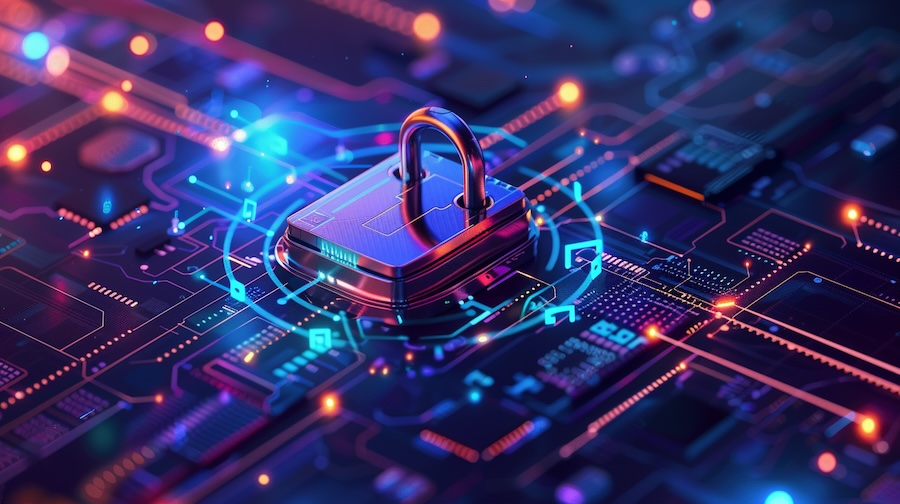We created this blog post for the EU-funded project “V2B: Creating NFT Opportunities on Metaverse for Art VET Trainees”, and our project reference number is 2022-1-DE02-KA210-VET-000080828. Coordinated by L4Y Learning for Youth GmbH in collaboration with Adana Cukurova Guzel Sanatlar and EMC Services Ltd, “Secure Blockchain Transactions: Essential Strategies is prepared related to the training framework in the introduction post.
This article discusses strategies for securing NFTs (Non-Fungible Tokens) and blockchain transactions. Protecting your investments and keeping sensitive data safe is extremely important, especially as digital assets and this technology are growing rapidly. To secure property rights, thwart cyber threats, and protect the integrity of your digital assets, this article covers the necessary measures to ensure the security of NFTs and blockchain transactions.
Blockchain security is essential for protecting transactions and digital assets on blockchains. Effective blockchain security strategies include encryption, consensus, immutability, smart contracts, and defense against cyberattacks. Therefore, implementing these strategies is critical for maintaining the overall security of blockchain networks.
NFTs (Non-fungible tokens) are unique and unchangeable digital assets created with blockchain technology. The security of NFTs includes protecting ownership rights, ensuring data integrity, and securing storage. NFTs can be the target of cyber hackers, so you must choose a reliable crypto wallet to store your NFTs and be careful against phishing attacks.
Finally, the protection of ownership rights for NFTs has become possible thanks to blockchain technology. NFTs are non-fungible tokens that are stored on blockchain networks. Consequently, these tokens prove ownership of digital assets and protect copyrights. By leveraging blockchain technology, you can ensure the authenticity and security of your NFTs, safeguarding your digital investments.
Learning Objectives:
By the end of this module, learners will:
- Understand the importance of securing NFTs and blockchain transactions.
- Learn blockchain security concepts, including encryption, consensus, and smart contracts.
- Identify secure storage options for NFTs
- Be aware of phishing risks and how to guard against them.
- Learn best practices for securing digital assets, including password management and two-factor authentication.
- Understand the importance of trusted sources for application downloads and privacy on social media.
What Measures Can You Take to Protect the Ownership Rights of NFTs?
Secure Blockchain Transactions: Hardware Wallet
Use a hardware wallet to store your NFTs. Hardware wallets offer higher security than software wallets because they are not internet-connected.
Examples of trusted hardware wallets include:
These wallets are designed to store cryptocurrencies securely. Each wallet has its advantages and disadvantages. Therefore, users must choose the most suitable cryptocurrency wallet according to their needs and preferences.
Secure Blockchain Transactions: Reliable And Licenced Platforms
Make sure that the platforms you trade NFTs on are trustworthy and licensed. Basically, check the platforms’ security certificates, user reviews, and support services.
There are many platforms available for those who want to trade NFTs. Examples of secure and licensed NFT trading platforms include the following:
These platforms provide a secure and licensed environment for those who wish to trade NFTs. However, each forum has its unique advantages and disadvantages. Therefore, users must choose the most suitable NFT trading platform based on their needs and preferences.
Phishing
Beware of phishing attacks when trading NFTs. Phishing attacks ask for your personal information or wallet password via fake emails, SMS, or websites.
Consider inflation and rarity factors to preserve the value of your NFTs. The value of your NFTs may change according to supply and demand in the market. Rare and in-demand NFTs may be more valuable.
Inflation And Rarity
Inflation and rarity factors play a pivotal role in upholding the value of NFTs. Therefore, consider inflation and rarity factors to preserve the value of your NFTs. The rarity of these tokens signifies the distinctiveness or scarcity of a particular non-fungible token within a collection. Collectors eagerly seek out rare NFTs, often leading to their sale at premium prices. Conversely, inflation in the realm of NFTs pertains to the expansion of the total NFT count within a collection, which can erode individual tokens’ value. Notably, the value of scarce NFTs escalates alongside their increasing rarity and demand. This emphasis on rarity holds particular significance for NFTs endowed with cultural or historical value, such as precious works of art.
Secure Blockchain Transactions: Ensuring The Data Integrity of NFTs
NFTs are crypto assets that have entered our lives with blockchain technology. They are unique digital data, so they are defined as “unalterable”. NFTs have a unique digital signature, just like DNA. Examples of uses of NFTs include the registration of artworks on the relevant platform and the web 3.0-based metaverse (creation of digital assets in gaming ecosystems).
Secure Blockchain Transactions: Secure Storage of NFTs
There are several methods for secure storage of NFTs. The most common way for storing NFTs is to use a wallet that guarantees the ownership and authenticity of NFTs using unique identities on the blockchain. These wallets are designed specifically to safeguard the authenticity and ownership of NFTs. Another method for storing NFTs is to use a protocol called IPFS (InterPlanetary File System). IPFS is based on a distributed, decentralised and peer-to-peer (P2P) storage network.
The network stores uploaded files on multiple computers. Thus, IPFS provides a more secure data storage experience.
Phishing Attacks To Which NFTs May Be Exposed
Phishing makes people believe they are interacting with a legitimate entity, such as a bank or a recognized company. Usually, this is done via an email or text message that appears to come from a legitimate entity. Typically, the recipient is asked to provide sensitive information, such as a password or credit card number, in the message.
A phishing attack is usually done via email. The victim receives an email asking to log in to a website page that may be familiar. However, the website is spoofed for the attack, and when the victim logs in, their credentials are exposed to malicious actors.
Moreover, phishing attacks are also used to seize crypto assets or, in other words, to steal them. For example, a malicious person can create a fake website copy. In this way, they can replace the wallet address provided by the trader with their wallet and convince the victim to pay for a service.
Therefore, knowing the types of fraud to protect against phishing attacks is essential. Because some cyberattacks or fraudulent transactions have a complex structure and can be very expensive for the victim. In cases where a person suspects and feels a phishing attack, they need to see some signs. The most common symptoms that a phishing attack can give itself away are as follows:
– Texts with frequent use of urgent, now, immediately, etc.
– Contents containing requests for personal and commercial information
– Texts with shortened URLs that redirect the person to websites are often used for phishing.
Measures Against These Attacks
For example, learning how phishing attacks occur and how to recognize them is crucial. Phishing attacks typically happen through email. Hence, it is vital that you check your emails carefully and do not open a suspicious email when you receive it. You should also check the sender address of emails and delete them if you see a suspicious address. Because of this, to protect against phishing attacks, using a strong password and changing it regularly is also essential. You can also take additional security measures, such as two-factor authentication. This increases the security of your account. Two-factor authentication requires using two different components, such as a password and a verification code, instead of users using only one password to access their accounts. This way, your accounts will be more secure.
Secure Blockchain Transactions: Cryptocurrency Wallets
Cryptocurrency wallets serve as specialized tools for securely housing cryptocurrencies. Typically available as hardware, software, or paper wallets, these tools provide various options for safeguarding digital assets. The security of cryptocurrency wallets has become even more critical, especially with the increase in their value. Examples of reliable cryptocurrency wallets include the following:
These wallets are designed to store cryptocurrencies securely. Each wallet has its advantages and disadvantages. Therefore, users must choose the most suitable cryptocurrency wallet according to their needs and preferences.
Smart Contracts
Automated and conditional pieces of code that run on the blockchain are called smart contracts. The security aspects of smart contracts depend on factors such as code quality, verification mechanisms, error handling, and update capability.
Secure Blockchain Transactions: Best practices for protecting your digital assets and identity
Using strong and unique passwords
Using strong and unique passwords is important to ensure the security of your accounts. A strong password is a password that is difficult to guess and crack. A unique password differs from the passwords you use on your other accounts. Here are some tips for creating a strong and unique password:
– Make your password at least 12 characters long.
– Use uppercase letters, lowercase letters, numbers, and symbols.
– Avoid utilizing personal details or quickly guessable information.
– Change your password regularly.
– Use a different password for each account.
To create a solid and unique password, you can use, for example, a verse from a song lyric or poem or a meaningful quote. To strengthen your password, you can change some letters into numbers or symbols. For example, you can create a password like “1L0v3t0Pl@yS0cc3r” from the sentence “I love to play soccer”.
To avoid forgetting your password, you can use a password manager. Password managers help you create strong and unique passwords and store different passwords for all your accounts. This way, you can use a separate and secure password for each account.
Enabling Two-Factor Authentication
Two-factor authentication is a method you can use to secure your accounts. Two-factor authentication involves utilising two distinct components that function in tandem to access your account.
This security measure intends to ensure that only you possess the means to access your account.
Using An Up-To-Date Antivirus Program
Employing an up-to-date antivirus program is crucial for shielding your computer from malware. These programs diligently identify and eliminate malicious software on your system. Given that malware can impair your computer’s performance, compromise data integrity, and facilitate theft, having a current antivirus program safeguards your system against contemporary threats, preempting malware infections. Moreover, antivirus software effectively intercepts hazardous websites and thoroughly scans email attachments. Doing so can effectively fortify your computer’s defences against malware..Regularly updating antivirus programs is equally vital. These updates bolster the protection of antivirus software against emerging threats, thereby enhancing the overall security of your computer.
Use Applications Downloaded From Trusted Sources
Using applications downloaded from trusted sources is important to protect your computer from malware. Malware can degrade your computer’s performance and steal or damage your data. Apps downloaded from trusted sources are usually available in the official app stores. For example, the Google Play Store for Android devices and the App Store for iOS devices are charged app stores. Apps from these stores can be downloaded and used safely. Apps downloaded from untrusted sources may damage your computer or contain malware. Therefore, it is recommended that you only download apps from trusted sources.
Not Sharing Your Personal Information On Social Media And Not Clicking On Phishing Emails
There are many important reasons why you should not share personal information on social media and should not click on phishing emails. Cyber hackers, cyber bullies, cyber stalkers, phishers, and other malicious individuals might manipulate the details you share on social media. The potential outcomes of this exploitation can entail severe consequences for you. For example;
Identity theft
For example, information you share on social media can be used to steal your identity and open fake accounts. This can lead to financial losses, damage to your reputation, and legal problems.
Doxxing
The information you share on social media may include sensitive information such as your address, telephone number, or place of work. People who want to harass or threaten you can post this information online. Consequently, this can cause mental distress, security risks, and career consequences.
Cyberbullying and Harassment
Additionally, information you share on social media can reveal personal aspects of you, such as your opinions, preferences, or lifestyle. People who want to criticize you can use this information to humiliate or harass you. This can negatively affect your self-esteem, mood, and social relationships.
Cyber Stalking
Individuals intent on tracking or surveilling you can use the information you share on social media to reveal your location, activities, and companions. Consequently, this intrusion can breach your privacy and place your physical safety at risk.
Manipulative Advertising
Sharing information on social media may reveal your interests, habits, or preferences, subsequently enabling the presentation of tailored advertisements. As a result, these advertisements can influence your decision-making and direct you towards purchasing unwanted or unnecessary items.
Phishing Attacks
The information shared on social media can be exploited to deceive you into revealing sensitive details, such as passwords or credit card numbers. These attacks typically occur via emails or messages impersonating genuine organizations. If you fall prey to such attacks, it could lead to compromised accounts or exposure to financial fraud.
Career Consequences
The information you share on social media may be visible to your employers or potential employers. This information may affect your professional image or suitability. For example, your social media profiles may be scrutinized during recruitment, and you may be rejected due to inappropriate content. Moreover, it can lead to dismissal if you make negative comments about your current employer.
For these reasons, limiting the information you share on social media and checking your privacy settings is crucial. You should also check the source and accuracy of the information you share. The information you share on social media can provide many benefits for you, but it can also carry many risks. Therefore, recommendations advise using social media wisely and responsibly.
Not Clicking On Phishing Emails Or Messages
Not clicking on phishing emails or messages is crucial to protect your computer and personal information. Cyber hackers send fake emails or letters to ask you for sensitive data through phishing. This data includes your password, credit card number, bank account, or credentials. These phishing emails or messages often impersonate legitimate organizations and urge you to take urgent action or click on a link. These links redirect you to a fake website, asking you to enter your details. Consequently, cyber hackers obtain your information and use it for malicious purposes.
Making A Backup of Your Digital Wallet;
Backing up your digital wallet can protect you against computer failures and human errors. If you encrypt your wallet, you can recover it even after someone steals your mobile phone or computer. Since some wallets use many secret private keys internally, it is important to back up your entire wallet
Storing Your Digital Assets in Cold Wallets
Cold wallets are more secure than hot wallets connected to the internet. Cold wallets are usually hardware devices that can look like a USB drive.
Hot wallets connect to the internet via your computer or phone, whereas cold wallets use hardware devices to keep your data offline. Hot wallets facilitate access for trading, while cold wallets are more suitable for long-term storage. Both types usually protect your crypto keys—sequences of letters and numbers generated by encryption to authorize your crypto transactions. The right kind of wallet depends on how much crypto you hold, your security preferences, and how easily you need to access your funds.
Secure Blockchain Transactions: Conclusion
This article titled “Secure NFTs and Blockchain Transactions” highlighted the importance of protecting your digital assets and securing your blockchain transactions. We’ve looked at strategies to protect your property rights, ensure data integrity, and defend against cyber threats. These strategies aim to build a strong foundation for digital investors and blockchain technology enthusiasts. Remember, secure NFTs and blockchain transactions will help us take a more solid and secure step into the future.
Thank you!










